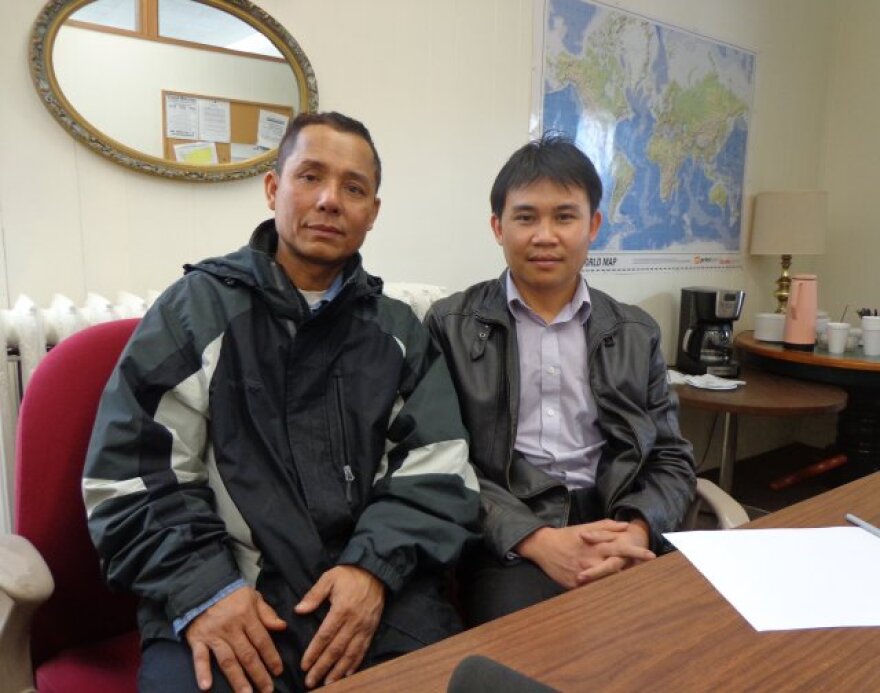Thousands rallied in Washington last week, urging Congress to create a path to citizenship, for undocumented immigrants.
Meanwhile, the U.S. continues to welcome a different set of people from other countries: refugees. They’ve fled their native lands, to escape persecution.
This year, the U.S. government will welcome 70,000 refugees. About 1,000 will head to Wisconsin.
Some local organizations have decades of experiencing in assisting refugees. Jewish Family Services started here more than 100 years ago, to serve people fleeing Russia. They were escaping pogroms – government-sponsored, anti-Semitic attacks.
“In 1882, we resettled over 700 Russian refugees, and there was a warehouse on Water Street for these refugees to live, until they got the appropriate housing,” says Gina Botshtein of Jewish Family Services. She says the agency has served one population after another, as people have fled persecution based on factors as race, religion or political opinion. Botshtein says today, five countries account for most of the refugees arriving in Wisconsin.
“Major countries that they’re coming from are Nepal, Bhutan, Burma, Iraq and Somalia.”
An Iraqi family is about to call Milwaukee “home.” A husband, wife, and their two small children have just landed at General Mitchell International Airport. About a dozen relatives – themselves, former refugees -- are waiting. They wave their arms when they see the family, and sob as they embrace for the first time in years. Through an interpreter, the husband tells me he’s relieved to be on U.S. soil. He says the family fled Iraq six years ago, and ever since has been living in Syria, waiting to resettle here.
“We’re going to feel better in this country, because we suffered a lot already.”
After brief greetings, a case manager leads the husband to a row of chairs, where he sits down to sign paperwork. It will bring his family food and Medicaid benefits. When he finishes, the relatives whisk the family out of the airport, eager to put them to bed. They’ve been traveling for two days.
The organization Catholic Charities will help the family establish a life in Milwaukee. Steven Xiong is director of Migrant and Refugee Services. He says many refugees arrive with little more than the clothes on their back.
“We start from scratch. First we have to look for donations for refugees, depending on how many people, the size of the family. Then we start from utensils to furniture and housing, to be fit into the family need.”

Catholic Charities’ office is located in a duplex on Milwaukee's west side. Part remains a living quarters, in case the agency has not yet secured an apartment. Thirty-eight-year-old Nai Raw of Burma is a former client and greets me at the office. He says his family arrived about three years ago and still reaches out for help, occasionally. A case manager translates for Raw.
“Catholic Charities sponsored my family, and they were helping me with find a job and housing, and also they enroll my children in school, and most of my family have a job now.”
Raw works as a meat cutter at Cargill Meat Solutions.
State Refugee Coordinator Mette Brogden says the jobs available to refugees vary, depending on their English skills and education. She says most jump at the earliest opportunity to work.
“We really encourage people to take the first entry-level job, because even if you’re coming into the country with a profession, you want to have some experience just in the American workplace, so that you understand some of the customs and procedures before you’re committed to getting into your destination occupation.”
Brogden says many refugees support themselves within a year. Until they find a job, they can collect about $600 a month in federal aid.
“They are assisted with case management services to get temporary cash benefits either through W-2 or through Refugee Cash Assistance.”
The W-2 benefits apply to refugees with children, and expire after five years. The Refugee Cash Assistance for childless adults runs out after eight months.
Brogden says another clock ticks as well. Within six months, refugees must start to repay the International Office of Migration, for the plane tickets that brought them here. The cost can run into the thousands of dollars.



